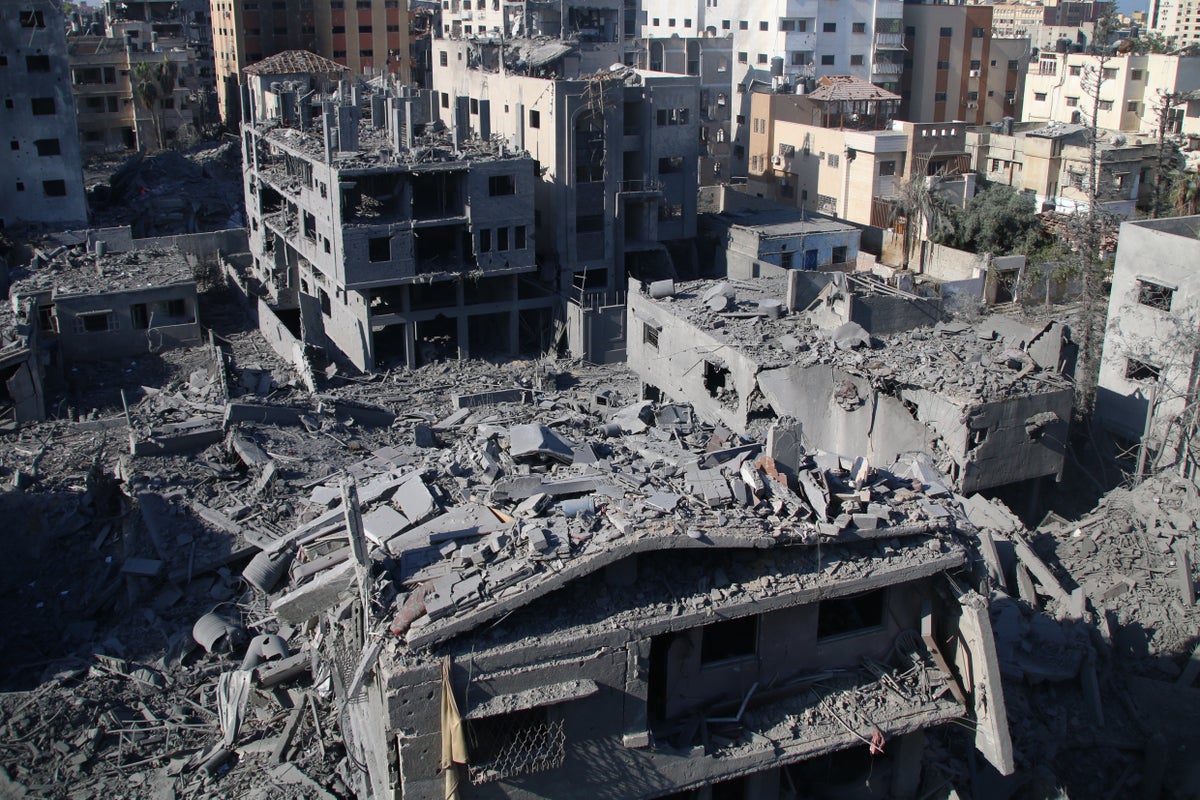
Sitting in a cramped room with peeling walls, Amir Badawi spoke of deep dread about the fate of his family in Gaza – his own future equally uncertain in the face of an impending Israeli ground assault.
He is among those from the territory working in Israel who had fled to the West Bank after facing retribution for the massacre carried out by Hamas in their assault across the border.
Amir and his companions say they arrived in Ramallah after being detained and beaten up by Israeli police. Other Gaza workers say they were rounded up by the security forces and dumped in the West Bank, or are asking for help to escape from Israeli settlers threatening to hold them hostage in revenge for captives taken to Gaza by Hamas.
Amir was in a room with half a dozen other workers in a dingy hotel near Ramallah while Palestinian authorities tried to organise relief. He had been working at a construction site near Tel Aviv until a few days ago when the situation became fraught.
“My wife and children in Gaza felt something bad may happen to me. That may sound funny, my family in Gaza worrying about me with all that is going on. The police arrested us and beat us. I may have ended up in prison if I had stayed where I was, but now I am so worried about my family, I can’t sleep thinking about them,” the 48-year-old told The Independent.
The demand by the Israeli government that more than one million people in Gaza immediately evacuate to the south of the small strip of land before a ground offensive begins has heightened fears about what horrors could lie ahead.
“My family are moving from our home in Gaza City to the south after the warning. They have no choice; we have had relations injured. I wish I was there to try and protect them. Anything can happen now; they are going to send troops and tanks. There’ll be many, many killed.”
Amir was a beneficiary of the Israeli government issuing 18,580 work permits to people in Gaza after a seeming calming of tensions with Hamas. Around 21,000 workers from Gaza have jobs in Israel. With unemployment in the territory running at more than 50 per cent, and jobs in Israel paying multiple times more, this proved a huge boon to the besieged community.
In Israel, the deal over the workers was viewed as signs by some that the militant Islamist movement may have started to turn away from violent confrontation in favour of political pragmatism. That proved to be shatteringly wrong.
“I did not think my family in Gaza would be in this position – I did not think I’d be in this position. Just a little time ago I was in a job earning good money to send home. Now everything has changed.”
Hamas military leadership boasted after the lethal attack that it was part of an elaborate and successful deception to lull the Israelis into a sense of false security while the raid was being planned. The Islamist group had never, they said, given up the quest for Palestinian nationhood through armed struggle.
Mustafa, who did not want his full name revealed, said he and fellow workers in the city of Safad were arrested and taken to a checkpoint in Jalama and bundled out to Palestinian security forces. “They said our work permit was no longer valid. It was clear that they did this to us because we’re from Gaza, there’s no other reason.”
Hundreds of workers from Gaza are now in the Palestinian National Authority-run West Bank. They are not sure that they can ever go back to work in Israel and, at the same time, they cannot join their families in Gaza which is now under an Israeli siege.
The Federation of Palestinian Trade Unions says some workers from Gaza are trapped in areas surrounded by hostile Israeli settlers and feel they are being targeted. Shaher Saad, the secretary general of the organisation, said: “They are scared. Extremist settlers are calling for these workers to be taken hostage. But we can’t do anything unfortunately because there are armed settlers around them.”
Laila Ghannam, governor of Ramallah and al-Bireh, said: “We have no choice but to help these people who had come to us. We have to provide them with the necessities they need. We are trying to work out how to resolve this situation for their future.”
Amir sees nothing but a dark future: “The suffering is going to get really bad for our people” he said.
“I am praying that my family are not harmed, that is all I can do.”







